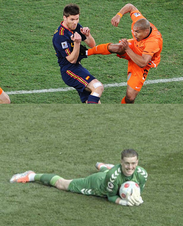
Anyone watching a broadcast of an English Premier League game over the last few days might think that the answer to Berman’s question is not the laws of soccer but the referees’ implementation of those same laws. TV commentators were repeatedly told viewers that referees were issued with new guidelines on how to implement the laws of the game when it came to contact. The new guidelines encouraged the referees to let the game flow or, to use the title of Berman’s paper, “let ‘em play”.
One game commentator noted that goalkeepers were the main culprits in slowing down the game by flouting the six-second law for holding the ball in their hands. A 2019 Frontiers in Psychology paper examined the issue. Otto Kolbinger and Michael Stockl found that goalkeepers violated the six-second rule 38% of the time and that none of these violations were published. None.
Kolbinger and Stockl label the violations “trivial”. Should referees turn a blind-eye to trivial violations of the rules? What are “trivial” violations? Should “trivial” violations be treated differently by referees depending on the stage of the game? It was the latter question that prompted Berman’s paper. In the introduction of the paper, Berman considered the outburst directed at an umpire in the 2009 US Open by Serena Williams. Many commentators and supporters argued that the umpire should not have called a foot-fault as the match drew to a close. The popular cry is “let ‘em play”.
Now back to Berman’s question about soccer. Berman argues that the problem with soccer is not with the penalisation of trivial violations that occur late in the game but the penalisation of serious violations that occur early in the game. According to Berman, the problem with soccer is the red card that reduces the number of players on the offending team for the remainder of the game. The same foul has a bigger impact if it is committed and sanctioned in the first minute compared to the last minute of a game. Berman suggests that referees/umpires might vary the way they approach to some of their “duties” depending on the time of the game.
Instead of using the 2009 US Open example, Berman could have used an example from the 2010 FIFA World Cup. Early in the game, the referee decided to issue a yellow card, instead of a red card, for a foul tackle (see accompanying picture above). Like in the 2009 US Open the official was loudly criticised. Since then, there has been a change to allow technology assist referees to review such decisions. If a similar event occurs in this year’s FIFA World Cup there will be less discretion for the referee. The recent direction to Premier League referees is another move in this direction. Even in 2011, Berman's answer to his question was "Not a whole lot."
 RSS Feed
RSS Feed